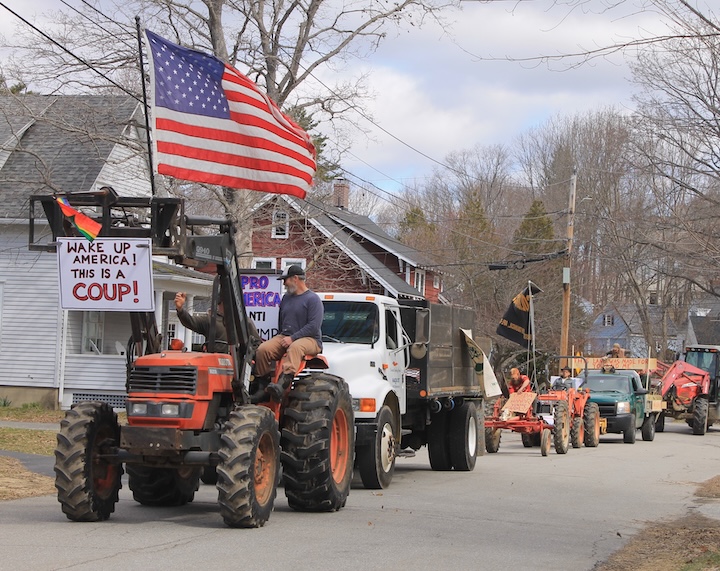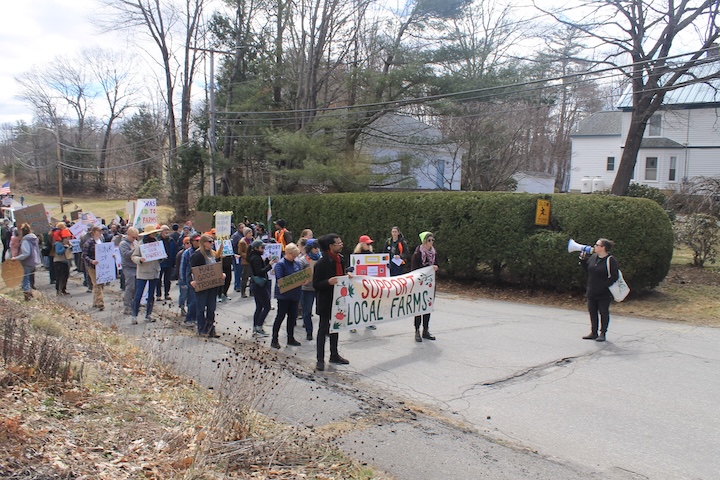On Friday, February 28, 2025, MOFGA organized a press conference that took place in South Portland, Maine, where farmers from across the state shared their stories of how federal funding freezes are directly impacting their livelihoods. The briefing was the first in a series of events as MOFGA escalated our tactics punching back on cuts to programming supporting small diversified, sustainable farms. As farmers and community members gathered, it became clear that the uncertainty surrounding the future of United States Department of Agriculture (USDA) funding is no longer a distant concern but a pressing issue. With millions of dollars in USDA funding, including support for various innovative and science-based programs that sustain farmers, now hanging in the balance, it is more important than ever for Maine’s organic farmers to organize and advocate for the preservation of these essential programs.
This funding freeze comes on the heels of a series of political shifts, with the Trump administration issuing a sweeping freeze on all federal funding programs. While a federal judge paused the freeze and the administration rescinded the memo soon after, the underlying executive order remained in place, leaving many in the farming community uncertain about the future of crucial support programs. Despite assurances from USDA that some payments will proceed, many farmers, including those who spoke at the February press conference, have yet to see, at the time of this writing in mid-April, their payments resume.
Coming Together as a Community to Respond
On the morning of April 16, Seth Kroeck from Crystal Spring Farm in Brunswick was driving his red tractor, not on his farm’s fields but on Maine’s back roads, embarking on a three-hour journey to Augusta as part of a powerful demonstration. Farmers from across the state joined Seth in sharing pictures and videos, capturing their own early-morning preparations as they loaded up tractors and hit the road, all bound for the state capitol for the Farmer Day of Action and tractor brigade organized by MOFGA.
It wasn’t just a convoy of farm equipment — it was a statement. Tractors lined up in long rows, some transported on trailers. Protest signs were taped to hoods and trailers, American flags waved, and behind each tractor was a farmer determined to be heard. At the Augusta State House, banners like “Support Local Farms” flapped in the breeze, and hugs were exchanged between old friends and new allies. Smiles, despite the gravity of the situation, were everywhere — on the faces of people who are committed to feeding Maine and protecting its rural communities.

The tractor brigade was more than just a show of strength — it was a direct response to harmful cuts and freezes in USDA programs. Farmers gathered to urge our congressional delegation to take action: to push back against decisions that jeopardize farmer livelihoods, to fight for reinstating critical programs, and to ensure that already-approved contracts are honored. The stakes are high. We heard from dozens of farmers about the consequences of these cuts — how programs are increasingly tailored to benefit large agribusiness while leaving small and mid-sized farms behind.
Organic producers in Maine alone sold over $124 million in products in 2024. These farms aren’t just economic engines — they’re cornerstones of vibrant communities and stewards of healthy ecosystems. Yet they’re among the most affected by the USDA’s recent moves. This isn’t just about Maine. It’s about a nationwide pattern that pressures farms to either “get big or get out.” Maine farmers are choosing a different path — and they’re standing together to demand it.
The Impact of Federal Funding on Maine’s Organic Farmers
Federal funding plays an essential role in supporting Maine’s organic farmers. MOFGA is instrumental in administering a variety of federally-funded programs that help local farmers grow, process, and sell organic produce. These programs, which focus on sustainable agriculture, organic certification, and food safety, are lifelines for small farms that often operate on narrow profit margins.
The freeze on USDA funding jeopardizes not only the farmers directly receiving payments but also the broader agricultural ecosystem in Maine. As Sarah Alexander, MOFGA’s executive director, aptly stated, “The impact of bringing our tax dollars home to invest in our farms, our community resilience, and our rural economies is significant. These programs can mean the difference between a farm succeeding or failing.” When federal funding is interrupted, it ripples through the entire food system, affecting everyone from the farmers to the consumers and beyond.
Programs that fund research into sustainable farming practices, support for beginning farmers, and local food systems development are all at risk. If these programs are not protected, it may set back Maine’s agricultural community by years, if not decades.
Organizing for Long-Term Sustainability
The current situation highlights a critical need for long-term organizing and advocacy to ensure that Maine’s organic farmers are not left vulnerable to political shifts and budgetary cuts. The briefings and tractor brigade organized by MOFGA and other organizations in the state serve as a model for how grassroots movements can protect their interests and advocate for policy changes. By coming together, farmers and their supporters can have a collective voice in policy discussions, ensuring that their concerns are heard at the state and federal levels.
Organizing is also crucial for building resilience within the agricultural community. The challenges posed by the federal funding freeze are not just about one specific program or payment but are part of a broader political and economic climate that seeks to undermine local food systems. By organizing, Maine’s farmers can help create a united front that pushes for policies that prioritize sustainability, equity, and the protection of local economies. This includes advocating for stronger support for organic agriculture, encouraging practices that regenerate the land rather than deplete it, and ensuring that small-scale farmers are not left behind in the push for economic growth.

Through its advocacy efforts, MOFGA is working closely with Maine’s congressional delegation to urge them to act decisively to protect the critical funding streams that support Maine’s farms, and Rep. Chellie Pingree spoke forcefully at our tractor brigade in Augusta. Without federal investments, Maine’s rural economies could suffer, leading to a loss of jobs, decreased food security, and increased reliance on industrial agriculture systems that may not align with the values of many Maine residents.
The Need for Solidarity and Advocacy
Ultimately, the importance of Maine organic farmers organizing cannot be overstated. It is a matter of survival for small farms, the preservation of local food systems, and the protection of the values that many Maine residents hold dear. As we face a changing political landscape and an uncertain future, it is clear that the strength of the agricultural community lies in its ability to come together, and advocate for policies that benefit everyone
By sharing stories, fostering relationships, and organizing together, we create a resilient community that can push back against harmful political shifts. It is through this solidarity that Maine can build a sustainable agricultural future — one that reflects the needs of its people and preserves its unique rural identity for generations to come. Organizing isn’t just about political power; it’s about ensuring community mutual support systems and the tools to advocate for the policies that will sustain them long term.
– Bill Pluecker, MOFGA’s Public Policy Organizer
This article was originally published in the summer 2025 issue of The Maine Organic Farmer & Gardener.